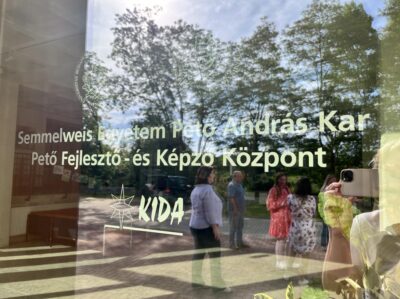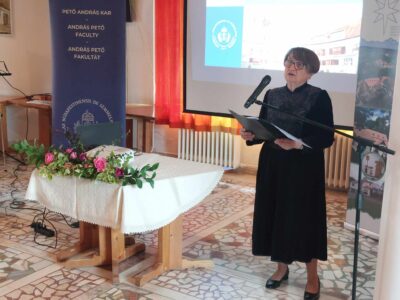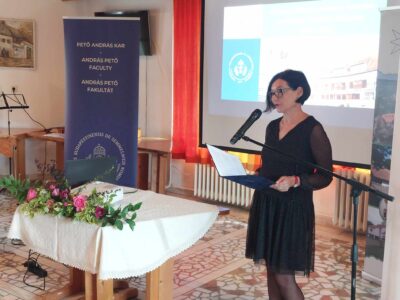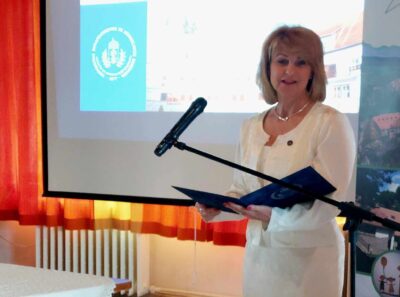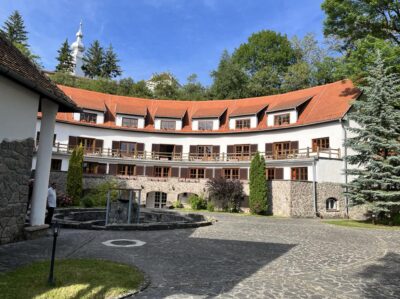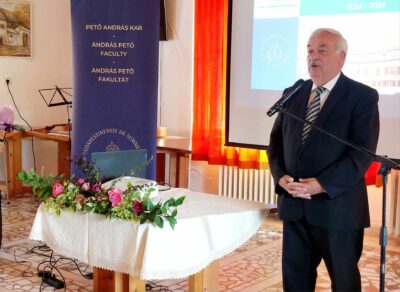In June 2014, the Pető András Faculty (then Pető András College) and the Transylvania Christian Youth and Deaconry Foundation (KIDA) began their cooperation with the support of the State Secretariat for National Policy. As a result of the cooperation, over the past decade, 680 children and 644 adults have been educated and their relatives have been supported using the conductive pedagogy method. Since 2017, the faculty has also been able to offer off-site conductor training. The institution’s director, Ibolya Kató, was awarded the Pro Universitate Prize by the Semmelweis University management for her ten years of dedicated work at the festive event at the Illyefalva center.
The festive program began with a welcome address by Ibolya Kató, the institution’s director. The host of the event expressed his gratitude for the work and dedication of all the organizations and professionals involved in the program, and emphasized the importance of finding each other, solidarity, and the important role of helping and related professions in cooperation. Referring to Domokos Szilágyi’s poem “Bartók in America,” he emphasized that “…life (…) and the highest level of organized form of interdependence is love,” which creates community and opportunity for those in need.
Réka Brendus, Head of Department at the State Secretariat for National Policy of the Prime Minister’s Office, highlighted in her speech the importance of the cross-border presence of conductive pedagogy through her personal memories. She emphasized that it is our moral duty to help our fellow human beings who are on the margins of society and to show them that they can be valuable members of society. “In today’s world, we often forget to pay attention to each other, to bend down to our fellow human beings, so the Carpathian Basin conductive pedagogy program is a special value, because instead of letting go, it offers attention, instead of giving up, it creates new opportunities and the possibility of access to a fuller life for those in need. Commemorating the past ten years is also about the tasks of the next ten years, therefore it is particularly important to stop, look back and keep in mind the basic principle of conductive education, the respect for humanity.” – she summarized in her welcome address.
On behalf of Semmelweis University, Chancellor Dr. Lívia Pavlik welcomed the participants. The university chancellor explained that cross-border education is in line with the university’s mission of strengthening the trinity of education, research and patient care, and the university’s social responsibility, which is not only in the interest of those living here but also of the university. The work carried out in cross-border areas enhances the university’s international visibility and its place in university rankings. “This endeavor is not self-serving, our goal is to provide even better care with its help, and to further improve our educational activities and research results – that is, to do even more for the healing of the sick and the help of the underprivileged.” – she added.
Semmelweis University Rector Béla Merkely expressed his pride in the collaboration’s achievements, highlighting the support provided to over 1300 individuals in Transylvania through conductive pedagogy. He emphasized the importance of the program’s social impact and the university’s commitment to social responsibility.
Former students and parents shared their personal experiences with conductive education. Huza Viktor, representing individuals with multiple sclerosis, expressed gratitude to KIDA staff and conductors for their continuous support. Farkas Zsófia, a parent of triplets who have benefitted from the program since its inception, described the transformative impact on their children’s lives, both physically and academically. Orbán Szilvia, a participant herself, recounted her journey of personal growth and empowerment through conductive education.
Tamás Sándor, President of Kovászna County Council, acknowledged the crucial role of civil society organizations in supplementing government efforts to support vulnerable individuals. He emphasized the importance of collaboration in building a stronger social safety net.
Dr. Andrea Zsebe Tenk, Dean of the Pető András Faculty at Semmelweis University, highlighted the significance of the conference venue as the birthplace of the program ten years ago. She also noted the faculty’s expansion of its conductive education programs beyond Budapest, with 32 graduates from its Carpathian Basin conductor training program.
Bishop Béla Kató concluded the event with a message of gratitude and remembrance, emphasizing the importance of national unity. He expressed hope for the continuation of the program and the dedication of future generations to this mission.
The afternoon of the jubilee celebration was dedicated to a professional program, where participants in Carpathian Basin operations over the past decade shared their experiences, insights, and lessons learned regarding conductive education and cross-border conductor training. The session was led by Pál Csuka, Director of the PAK’s Center for International and National Services, and Dr. Renáta Földesi, Director of the PAK’s Institute of Conductive Education.
The day-long event concluded with a joint cultural program at the Illyefalva Reformed Church.
